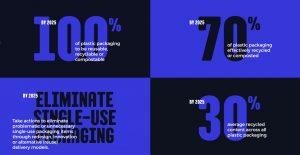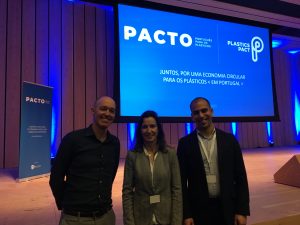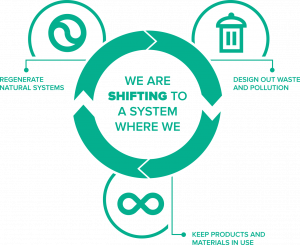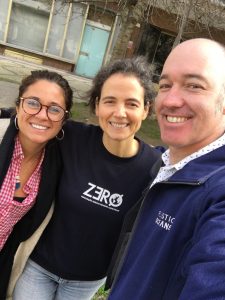On the 4th of February I represented Plastic Oceans International in Lisbon Portugal at the launch event of the Portuguese Plastics Pact. It’s the 6th Pact worldwide after the UK, France, Chile, the Netherlands and South Africa. In Portugal the implementation is being led by Smartwaste Portugal.
The Plastics Pact

Image: Wrap UK
The Plastics Pact is an initiative of the Ellen MacArthur foundation and brings together the entire plastics value chain: plastic producers, companies, consumers, government, waste picker associations, recyclers, NGO´s, designers, companies and finally companies that turn recycled plastics into new products. Its goal is to create a circular economy for plastics (New Plastics Economy), where no plastic ends up as waste, meaning:landfill, waste to energy or the environment. There are 4 main targets that have to be achieved before 2025 (see graphic). These targets complement existing legislation, EPR schemes (Extended Producer Responsibility) and other initiatives to regulate and/or eliminate (mainly) single use plastics.
The start of the Pact

From left to Right: Mark Minneboo – Luisa Magelhaes – Pedro Sao Simao
I have been representing Plastics Oceans Chile in the strategic board of the Chilean Plastics Pact since April 2019. The involvement with Smartwaste Portugal started at CEFA 2018, the first international Circular Economy conference for the Americas, held in Santiago, and co-organized by Plastic Oceans Chile. Here I met its founder Pedro São Simão and he invited Plastic Oceans for the Portuguese pact, because of our experience in educating about the problem and our global view of the problem. He and his colleague Luisa have done a great job by bringing together all the stakeholders in this pact in such a short time.
An essential tool
We consider the circular economy, if well implemented, an essential tool for our work, where we show stakeholders what is happening in the oceans, how plastics are affecting our environment (and us) and also how everyone can be part of the solution, NOW! From experience I know that generating change is a very slow process, and even the most convincing arguments and shocking images are not enough.

Image credits: Ellen MacArthur foundation
By applying the circular economy in our work we have a system and a vocabulary that everyone
understands and which can easily be used to transform habits, transform design- and production of products and end of product life management. The circular economy is collaborative by default, like nature, its a system where all parts work together to achieve a circular goal. Nobody can do it on its own. But the circular economy is also about ECONOMY, meaning, companies will only jump in if there is money to be made and money can be saved. We will have to make sure that every stakeholder in this circular system will play a part, if one drops out, the whole system collapses…..and we are back at the linear system.
A Critical Friend

From left to right: Renate from Sciaena, Susana from Zero and Mark from Plastic Oceans
The Portuguese Pact has a so-called critical friend in its directory. Its an NGO that is part of the strategic board and makes sure with its interventions that the associated companies are truly ambitious. But the critical friend does more, its also to ensure the pact works according to Circular Economy principals. In Chile we have this role in the Chilean pact and in Portugal its Zero. I had a great meeting with its director Susana Fonseca and also Renate Fleck from Sciaena, to exchange ideas and form a cross Atlantic strategic partnership. Both organizations do very important work in Portugal, have years of grassroots experience and we are happy to be able to consider them friends across the pond.
Best practices
Like the associated companies are exchanging best practices and ideas between their local branches involved in the different Pacts, us NGO´s should do the same to make sure these Pacts will be a success. Thus we finally manage to reduce single use plastics globally. If not well implemented, the Pacts will become just another greenwashing attempt where the main focus is only on recycling single use plastics and not solving the real problem.
All of our offices do a lot of local work, understanding problems and finding local solutions with communities, but the plastic crisis is a global one and we consider taking our local experiences to this international Plastic Pact platform being essential in our mission to end plastic pollution.

Trackback: บับเบิ้ล
Trackback: herbal supplements